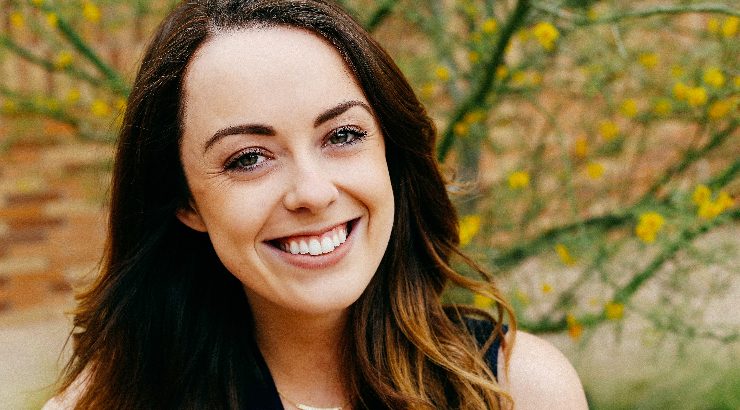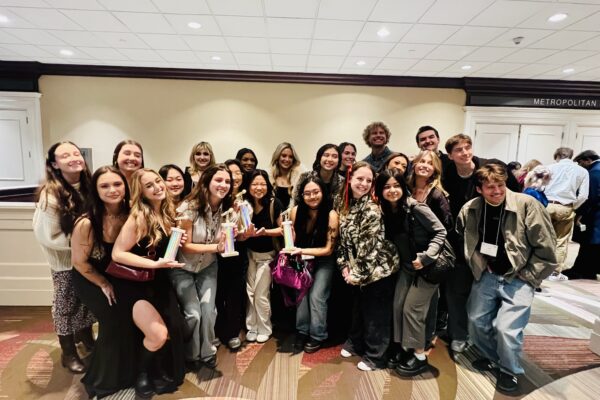The day Sarah Miller’s work required her to interview a nurse who accidentally overdosed a hospital patient, the Chapman University alumna knew she had chosen the right career path.
One of Miller’s responsibilities with the Patient Safety Foundation is to help people involved on both sides of medical error share their stories in videos and educational programming so that other health care workers can learn from them and further accidents might be averted.
“This nurse found out about the work that we do here and she was really passionate about our mission and vision,” says Miller ’15 (MS ’16), who earned her master’s in health and strategic communication at Chapman and is now director of partnerships with the Patient Safety Foundation. “These are the kinds of people that make you want to get up in the morning. It’s inspiring.”
Investing in Health Sciences
That kind of passion is typical among the increasing numbers of Chapman University alumni graduating from the university’s graduate programs in health sciences. In the last several years, the university has added new graduate programs and expanded others, training the next generation of health care professionals across the spectrum, from pharmacists to physician assistants.
New infrastructure for the programs includes state-of-the-art core lab facilities at the Harry and Diane Rinker Health Science Campus in Irvine, while on the Orange campus new and revamped classroom buildings serve graduate students in strategic health and communication and marriage and family therapy programs.
All together, they are equipping a health care work force with the skills needed to succeed in today’s team-based health care environments. Moreover, they graduate ready to contribute to a new focus aimed at improving health care for all, says Janeen Hill, Ph.D., dean of Crean College of Health and Behavioral Sciences.
“We educate future healthcare professionals who are compassionate and concerned with the health of individual people and the more significant challenges of population or public health,” Hill says. “We are increasingly and deeply concerned about what each of us can do to further improve and accelerate the education of our students who we know will be an essential part of defeating the virus and confronting head-on injustice, prejudice, and systemic inhumanity.”
For many, the work is already underway.
Pharmacists Serve Patients in a Growing Health Care Sector
“Over 200 Chapman University School of Pharmacy alumni are on the front line to the COVID-19 response around the nation,” Jordan says.
A healthier future is certainly foremost in the mind of Chapman University School of Pharmacy alumnus Hung Do (MS ’16). Do, a graduate of the MS in pharmaceutical sciences program, is now a drug safety officer with the FDA.
“We all have friends and family members who need safe medications, and we want them to have the best possible care. Knowing regulatory science and health policy allows us to make better choices and create good decisions on complex issues. Therefore, we help improve patient outcomes,” Do says.
To help meet the need of that growing health care sector, Chapman this year launches two graduate programs at its School of Pharmacy. The master’s of science programs, one in patient safety and the other in regulatory affairs, build on the university’s goal to prepare global citizens who make positive impacts, says Ron Jordan, the school’s founding dean.
“Regulatory affairs professionals within industry and leaders in patient safety within health delivery developed in our new programs will make considerable contributions in these areas.” Jordan says.
Physician Assistants Meet the Challenge Increasing Health Care Demands
Likewise, graduates from the university’s physician assistant program are at the forefront of another vital response to health care demands.
Katie Cornella (MMS ‘18) discovered her passion for a specialty – cardiology – during a rotation in Chapman’s Physician Assistant Program. Now she works as a PA at the Orange County Heart Institute and Research Center.
It’s important work. Heart disease is the leading cause of death for both men and women.
Cornella experiences many rewards in providing care, including the chance to spend more time with her patients than is typically possible for physicians. Patients share their gratitude when she details their diagnosis and takes their questions about all the steps in the process.
“That ultimately increases their confidence in the treatment plan,” Cornella says.
The PA and pharmacy programs are located at the Rinker campus. Facilities investment there also allowed the university to relocate its distinguished programs in speech language disorders and physical therapy to Irvine, creating a health sciences hub in proximity to the county’s growing biotech sector.
Similarly, on its campus in Orange the university revamped the Frances Smith Center for Individual and Family Therapy, a community clinic that provides students supervised clinical experience and offers community members free and low-cost counseling.
Communication Skills Are “Critically Needed in Health Care”
Across campus, state-of-the-art classrooms in Doti Hall serve students in the MS in strategic health and communication program. Their skills are critically needed in health care, too, says Lisa Sparks, Ph.D., founding dean of the School of Communication.
“Courses are designed to educate students in health communication theory and methodology and to evaluate important communication topics such as delivering upsetting news, the accuracy of the media, the digital divide, public advocacy, intercultural sensitivity and/or cultural competence, health literacy, and the quality of interpersonal relationships,” Sparks says.
Improving Patient Outcomes
For graduates like Miller of the Patient Safety Foundation, the strategic health communication program opened a door into a career that allows her to use her people skills while helping to create a healthier world, the ultimate goal of all Chapman health science programs.
And the nurse who made the medical error? Her patient recovered and the nurse gained a measure of solace by sharing her story with Miller for an educational video.
Miller’s glad she was there to help with the healing.
“The work that we do here really makes a difference,” she says.
Learn More
Learn more about Chapman’s graduate health science programs:
- MS in Health and Strategic Communication at the School of Communication
- MS in Pharmaceutical Sciences at the School of Pharmacy
- MA in Marriage and Family Therapy at Crean College
- MMA PA Studies at Crean College




